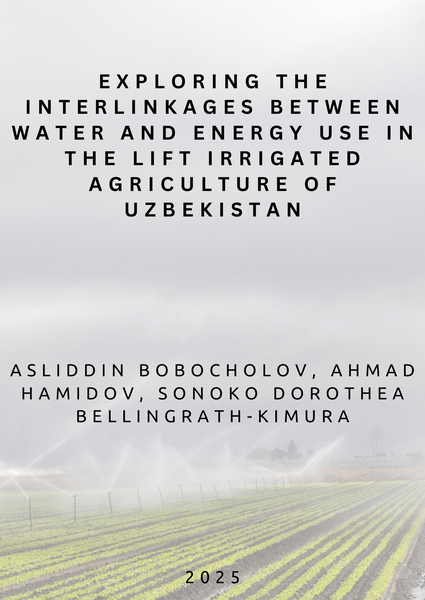




Year: 2025
Collections: Scientific Publications
Topics: Water, Energy, Agriculture
Authors: Hamidov Ahmad, Bobocholov Asliddin, Sonoko Dorothea Bellingrath-Kimura
Countries: Uzbekistan
Source: water-ca.org
The water, energy, and food (WEF) nexus is being promoted as a conceptual idea for achieving sustainable development, that describes the interconnections and interdependencies between those three sectors. The main objective of this article is to operationalize the WEF nexus concept in lift-irrigated areas of Uzbekistan through involving local stakeholders, to investigate the WEF nexus within the lift-irrigated agriculture of the Kashkadarya region, an area heavily reliant on the Karshi Canal system. The study is grounded in the urgent need for sustainable development, with a focus on enhancing intersectoral cooperation between water, energy, and food sectors. A case study methodology was employed, incorporating semi-structured interviews with experts, alongside local farmers and scientists. Data were analysed using the qualitative analysis software, Atlas.ti. The results indicate significant challenges to intersectoral cooperation in the WEF nexus, including lack of trust, communication barriers, differing priorities, and insufficient political will. However, the findings also highlight the potential benefits of improved cooperation, such as enhanced resource efficiency, reduced operational costs, and mitigated risks from environmental stressors like drought. The study concludes that, according to stakeholders’ opinions, while the WEF nexus presents critical opportunities for advancing sustainable development in Uzbekistan, substantial barriers must be addressed to realize these benefits. Recommendations include promoting sustainable agriculture to reduce water dependency, improving energy security by diversifying energy sources, and raising awareness of the WEF nexus’s importance. Furthermore, fostering stronger stakeholder cooperation is crucial for achieving Uzbekistan’s Sustainable Development Goals (SDGs) by 2030.
Downloads:
The water, energy, and food (WEF) nexus is being promoted as a conceptual idea for achieving sustainable development, that describes the interconnections and interdependencies between those three sectors. The main objective of this article is to operationalize the WEF nexus concept in lift-irrigated areas of Uzbekistan through involving local stakeholders, to investigate the WEF nexus within the lift-irrigated agriculture of the Kashkadarya region, an area heavily reliant on the Karshi Canal system. The study is grounded in the urgent need for sustainable development, with a focus on enhancing intersectoral cooperation between water, energy, and food sectors. A case study methodology was employed, incorporating semi-structured interviews with experts, alongside local farmers and scientists. Data were analysed using the qualitative analysis software, Atlas.ti. The results indicate significant challenges to intersectoral cooperation in the WEF nexus, including lack of trust, communication barriers, differing priorities, and insufficient political will. However, the findings also highlight the potential benefits of improved cooperation, such as enhanced resource efficiency, reduced operational costs, and mitigated risks from environmental stressors like drought. The study concludes that, according to stakeholders’ opinions, while the WEF nexus presents critical opportunities for advancing sustainable development in Uzbekistan, substantial barriers must be addressed to realize these benefits. Recommendations include promoting sustainable agriculture to reduce water dependency, improving energy security by diversifying energy sources, and raising awareness of the WEF nexus’s importance. Furthermore, fostering stronger stakeholder cooperation is crucial for achieving Uzbekistan’s Sustainable Development Goals (SDGs) by 2030.
По всем вопросам сотрудничества обращайтесь по эл.адресу или телефону: